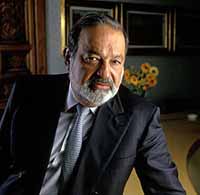Mexican billionaire gaining on Gates and Buffett
The world's third-richest man, Carlos Slim, is gaining rapidly on Bill Gates and Warren Buffet with a fortune that grew $19 billion (EUR14 billion) last year the largest wealth gain in the past decade tracked by Forbes magazine.

Since Slim bought Mexico's telephone monopoly in a 1991 privatization, he has kept rates high in a country where the minimum wage is about 50 cents per hour, and has used Telmex as a cash cow to build a business empire that includes Latin America's largest mobile phone company as well as banks, Internet providers, oil industry equipment makers, retail stores and restaurants.
To Mexicans, who make Slim richer with nearly every phone call or trip to the mall, his stunning rise illustrates that Mexican businessmen can run world class companies. But it also inspires anger at Mexico's monopoly-heavy economy, which concentrates wealth in the hands of a relatively tiny elite.
"Why should we want a few people to hoard all the wealth, if the majority of Mexicans don't have enough to eat and 30 million Mexicans live on less than 22 pesos (US$2) per day?" thundered former leftist presidential candidate Andres Manuel Lopez Obrador after Slim's dizzying rise was announced by Forbes magazine last week.
Now worth an estimated US$49 billion (EUR37 billion), Slim is on track to overtake the Americans at the top of the list, particularly since Buffet (US$52 billion), who made his money running the Berkshire Hathaway Inc. investment fund, and Gates (US$56 billion), who founded Microsoft Corp., are more focused nowadays on giving their fortunes away.
Gates, who set up the world's richest charity foundation, has said he believes "that with great wealth comes great responsibility, a responsibility to give back to society."
Buffett agreed with that sentiment last year when he said he would send about US$1.5 billion (EUR1.1 billion) every year to the Bill & Melinda Gates Foundation, which has an endowment of US$33 billion (EUR25.1 billion).
On Monday, Slim announced he would invest in health care and would launch a program to supply low-cost computers to rural residents.
Telmex already sponsors a charity foundation that supports education and social programs in Mexico, and billionaire's investments in downtown real estate led to an urban renewal in Mexico City's center.
Slim said his charitable foundations have about US$4 billion in endowments.
But at 67, he is still expanding an increasingly diversified empire that now involves his three sons, and does not appear ready to focus on philanthropy.
Slim said Monday that businessmen should not "go around like Santa Claus."
"The businessman with his talent, experience and vocation should participate more by doing" than by donating, he told a news conference.
Latin American billionaires _ there are 10 others in Mexico alone _ do not have a record of charitable giving comparable to Buffet or Gates, for historic reasons and because the region's tax laws often don't encourage it as much.
"It's not that there is a lack of good will, it's that it has been customary here to see social programs as the duty of the government," said Manuel Arango, a founder of the Mexican Center for Philanthropy.
Slim's critics say he could do more for Mexicans by lowering consumer prices than by making charity donations.
A 2005 report by the Organization for Economic Cooperation and Development found Mexico's phone rates among the highest in the 30-member group of developed nations, though Telmex questions the study's methodology.
"It's not so much that he's building a fortune," said Mexico City-based economist Jonathan Heath. "The thing that's bad is that he's building more on his monopolies, he's getting monopolistic rents, that's why he's become so stinking rich."
Slim's companies control more than 90 percent of fixed phone lines and about 70 percent of cell phone service in Mexico an advantage that is not unusual among Mexican businesses. Mexicans pay more than other, wealthier nations for a variety of highly concentrated services ranging from electricity to bank fees to cement.
Cemex, the dominant cement company, could become one of the world's biggest building materials companies if it succeeds in taking over Australia's Rinker Group Ltd. an expansion funded in part by charging Mexicans about twice as much as American prices for cement.
Mexican President Felipe Calderon has promised to battle monopolistic practices throughout Mexico, but past efforts to do the same have been thwarted by the country's entrenched elite.
Slim, meanwhile, has built both vertical and horizontal networks of businesses. The two largest are America Movil SA which last year had revenue of US$21.6 billion (EUR16.4 billion) and fixed-line giant Telefonos de Mexico SA, with 2006 sales of US$15.9 billion (EUR12.1 billion).
Diners at Slim's ubiquitous Sanborns restaurants can use Slim's wireless service to connect to Slim's Internet provider and check their holdings through Slim's brokerage, part ofSlim's Grupo Financiero Inbursa group. Banking online, they can pay bills to Slim's car insurance company or credit cards for Slim's retail stores, among them Sears' Mexico and the Mixup record store chain.
Slim faces a potential challenge in the telecom sector from the Televisa network, which controls about 70 percent of Mexico's broadcast market and is looking to extend its dominance in emerging platforms integrating telephone, television and Internet transmissions.
"This could be a destabilizing factor. It could readjust the players on the chess board," said Celso Garrido, an economics professor at the National Autonomous University of Mexico, reports AP.
But many question whether that is the best Mexico can hope for one monopolistic player battling it out against another, for increasing control of Mexican consumers.
Subscribe to Pravda.Ru Telegram channel, Facebook, RSS!




